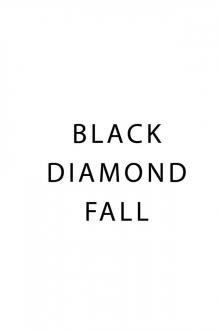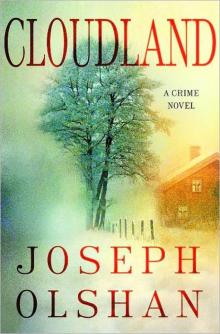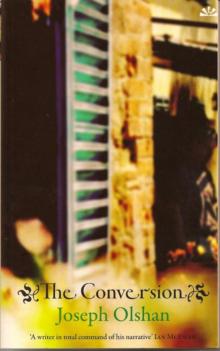- Home
- Joseph Olshan
The Conversion Page 5
The Conversion Read online
Page 5
“I’m sorry, but I haven’t,” I say, which is a lie.
Shortly after Ed died, before Annie found and read the papers he had left in the hotel room, I removed his manuscript from my old computer bag, sandwiched it among my own belongings, and replaced it with a pile of mail that I’d been carrying around for him. I did this because I believed that Ed would not want the book published in its present form and knew that if Annie found it, she would take it back to his publishers in New York. As soon as Annie had finishing going through Ed’s papers, I’d put the manuscript of his memoir back in my old computer bag and brought it with me to Italy.
Ed was so paranoid about his work-in-progress that he always kept it hidden and either read parts of it aloud to me or gave me small excerpts for written commentary. I never saw the piles of pages in their entirety until after he died. And so, I reason, if the work was so vital to him, wouldn’t he have made a copy of it as he did all his poetry, even the material he ended up destroying? Surely this must mean that he had no intention of allowing the memoir to leave his hands until he was completely finished with it. If this is true, how can I possibly give it up now?
Four
Holding a walking stick, Marina and the dogs are waiting for me out on the loggia. I quickly relay to her the gist of my conversation with Annie. Surely Marina will want to know if I actually have the manuscript, and I am prepared to unburden myself completely. I’m surprised when she merely remarks, “That impossible woman! This is exactly why I destroy all the drafts of my books as well as the notes I take. I do not like this idea of scholarship trying to take unfinished work and separating good ideas from the chaff. I like it even less—I despise it, in fact—when a writer’s private life is discussed and dissected in a biography. Their work fine, but what they did in bed, what for?” She bangs her stick on the ground as though to emphasize her point. “Now, are you ready to walk?”
A steep grassy slope descends to a lily pond, and the dogs, bounding ahead of us, leap into the water. They emerge shaking and jubilant, trying to rub up against Marina, who shoos them away. Even when her bare legs end up covered with mud splatters that look like slugs, she doesn’t seem to mind so terribly much. Having watched the dogs piling into her wing of the villa at night, I now ask if she allows them on the bed. “Oh, yes,” she says. “They go wherever they please.”
“So they all sleep with you?”
“They quarrel over me, actually,” she says, as if pleased by the idea. “There isn’t room enough for six dogs. The bigger one there”—she gestures to a tall and sturdy black-and-white dog with a splotch of discolored pigment over one eye—“although he is capo, he usually lets the others sleep with me and takes the floor. Primo is the wise one. He dominates but he is fair. We call him Il Papa, Primo. After the Pope.” She goes on to say her room clears out when a bitch in the neighborhood goes into heat. “Then I only have two girls with me.” She bends down to pat what looks like an Australian shepherd cross. “Isn’t that right, Suzy?”
Marina reminds me a bit of an English aristocrat who favors her pets over other human beings and shows them an infinite patience. “So none of the male dogs is fixed?”
She says, bridling, “We don’t believe in this. In Italy you don’t cut a male and deprive him of his sex life. You’ve been here enough times. You should know this by now.”
“Ah, but then you’ll spay the females? Isn’t that sexist?”
Marina refuses to rise to the bait. “It’s a bit more complicated. Females will give birth to puppies who could be neglected and starve to death. A terrible cruelty. Besides, my girls, although they are fixed, can still make love. And they do. And have always done. There have been many, many dogs at the Villa Guidi, ever since I was a small child. And the bitches, no matter if they were fixed or not, were always making love.”
We’ve been following the tall meandering stone wall that seems to be in very good condition; Marina claims it was built in the sixteenth century and has never been restored. With dogs racing back and forth, we stroll along a row of tall, impressive linden trees until we intersect the property’s long gravel driveway and its sweeping front lawns.
“You describe this wall in your novel about World War II, don’t you?” I say. She nods and I tell her, “I’ve only seen the film version.”
Marina turns to me and points to a large cave on the far side of the lawn that seems to be some kind of underground entrance. “That’s where a Jewish family came and went to their hiding place.”
“But it’s a pretty obvious entry.”
“Now it is. But during the war there was lots of undergrowth and they could slip in and out undetected.”
As we near the entrance to the hiding place, Marina describes how the villa, where she also lived as a child, was seized by the Nazis and used as a command post. Her father, a famous anti-fascist, was forced to go into hiding in the Apennines, leaving his wife and five-year-old daughter. The Germans overran the main living areas and the upstairs trompe l’oeil ballroom, forcing the fatherless family to move into what had once been servants’ apartments at the basement level. “Because I was raised by a German nanny and spoke the language perfectly, I was called upon to be the middleman between the Nazis and my mother,” Marina tells me. “They sent messages back and forth through me. For example, my mother would complain about how the house was being treated. The commandant would try to show her some respect. He’d promise that his men would be more careful, but he never was true to his word. They continued to disregard the house.” She smiles. “Then, can you imagine, the commandant used to tell me what a perfect German child I’d make and what a shame it was that I was born the daughter of an anti-fascist.
“But the story has an even more interesting angle. Close family friends of my parents—a Jewish scientist, Signor Stellini, and his family—went into seclusion in a maze of burrows inside the lower walls. This hiding place was put there when the villa was constructed during the fifteenth century. So they lived on the other side of the walls from us in the basement and my mother provided food and water to them. At night, after the Germans got done with their drinking and their singing in the upstairs ballroom, the Stellinis came out from behind the walls and played rubbers of bridge with my mother.
“Then one night one of the guards saw the youngest of the Stellini boys going into this very entryway that we stand facing, and after that there was a great deal of suspicion. The commandant started asking my mother about the goings-on down where we were living, whereas up until then they could have hardly cared less about it. The Stellinis realized they should be afraid, and my mother managed to relocate them to a nearby convent, which also had underground chambers. They were wonderfully looked after by an order of Carmelite nuns—so much so, in fact, that they eventually converted to Catholicism.”
A squirrel suddenly darts out from a thicket near the secret entrance and the dogs give it a frenzied chase.
“This conversion,” I say, “isn’t it how you got the title of your book?”
Marina nods.
“So are any of these converts still alive?”
“They all died, except for one of the daughters, who still lives in town. She’s actually a good friend of mine. She comes to the villa to play bridge.”
“Does she ever visit her old haunts?”
“We don’t speak of them. She acts as though that time of her life never happened.”
We begin walking again while I digest this idea of somebody refusing to revisit a childhood memory. “Well, surely she read your novel.”
Marina looks doubtful. “Honestly, I don’t think she ever did. But then, why should she? She lived it. She doesn’t have to read about it.”
“Yes, but surely there are differences. It’s a novel, after all. Unless you’re saying it’s more memoir.”
“It’s not memoir. It’s autobiographical fiction, as are all my books. Just for the record, I don’t believe in writing memoirs unless either they’re cautionary tales or t
he author has what I would call a Nabokovian power of recall. Otherwise the details are usually made up. So the book may as well be a novel.”
Then something occurs to me. Perhaps the Stellinis’ religious conversion was a delusional state brought on by the belief that if the past was erased from their memory, then it would never have existed.
We begin to loop backward toward the villa’s façade that, from where we stand, looks like a tall ocher-colored square cake with its characteristically Tuscan terra-cotta roof. I hear a slam and notice on one of the upper floors Carla opening the shutters to welcome the cooling air. A favorite phrase of Italian wafts over me—spalancare le persiane, to throw open shutters. The wonderful mystery of another language is how certain words and phrases take on a kind of exotic resonance and even a concision that might be impossible to rival in the native tongue. In this case, the verb, spalancare, describes one action that in English is expressed by two: throw open. The other word, persiane, intimates the Middle Eastern origin of a shutter (rather than something Venetian), bringing an alien flavor to something that otherwise appears to be rather ordinary. A translator must always be aware that certain phrases and ideas do not always find easy equivalents in other tongues; they can be like two religions based on similar principles but that have flourished under the organization of different regimes. Some words simply cannot be converted. They are devoutly untranslatable.
“I almost converted. Recently,” I suddenly find myself admitting to Marina.
She stops in her tracks and looks horrified. “Really, and what possessed you?”
Momentarily affronted, I say, “Well, your friends did.”
“But they had a concrete reason. They converted to save themselves. So they could act the part if and when the Nazis came.”
“But they never went back to Judaism.”
“Well, first of all, they brainwashed themselves into believing they were Catholics. And second, they gave me the impression that had they decided to convert back to Judaism they wouldn’t have been so easily welcomed back by their Jewish brethren.” She scrutinizes me. “So what’s your reason for wanting to convert?”
“Love … pure and simple. I was under its influence.”
She grins. “Ah. Of course.”
“I might even have gone through with it if it hadn’t been for my father, who threatened to disinherit me.”
She laughs. “Good for your father, to threaten you like this. Not that I suggest his punishment would have been deserved. Rather, good that he stopped you from doing something foolish. Correct me if I’m wrong, but it’s through your mother that you’re related to Giorgio Bassani?”
I nod.
“Who wrote about a family of Italians who were deported to the death camps and died because they were Jewish. But leaving this aside, I happen to believe that if you’re born into a religion you should stick with it. Since fundamentally most organized religions are one and the same. It’s the fundamentalists who are trying to make us believe otherwise.”
Marina gently taps my shin with her walking stick. “So, now tell me how did love nearly bring you to conversion?”
And so I tell her about my relationship with an Episcopal priest from Argentina whom I’d met at the gym in lower Manhattan and who convinced me to start attending Trinity Church. How I used to approach the altar with the rest of the communicants and rather than taking the wafer, crossed my arms and received a blessing from James, my lover, who made the sign of the cross on my forehead. The first time I received his blessing, it left me in a jittery elation. At first I assumed it was merely the thrill of being touched publicly by the man who made love to me in private, but then I began to wonder if the experience itself might be divine. I found myself lamenting that Judaism had no equivalent of Holy Communion and made the mistake of mentioning this to James.
One Sunday, while I was kneeling in the Communion line, instead of making the sign of a blessing on my forehead as he usually did for those who were not Episcopal, James deftly slipped the wafer into my mouth. Taking me with the sacrament as he took me with his body. The host dissolving on my tongue tasted of exhilaration but also undeniably of bitter shame. I made a move to get up from the rail, to avoid drinking holy wine from its chalice. A scorching look from James told me I must remain, and soon I had my sip, committing my second sacrilege.
An hour later we were in bed together. And he was whispering something in my ear, though I couldn’t quite make out what he was saying. Or so I told myself at the time. When we were through and lying there, James began to insist that I take the necessary instruction to make an Episcopalian conversion.
“I’m not ready to,” I told him. “I need to consider something like this for a while. It’s a big step.”
“But in a way you already have converted,” he said. “You had the sacrament.”
“You forced me.”
“You opened your mouth, you took it willingly. Like a little fish,” he said with a devilish smile. His liquid dark Latino eyes fixed me in a fervent stare. I said no more. I knew he was unused to being opposed.
I describe to Marina how James lived a half a block from Trinity Church in an apartment that overlooked the crater where the World Trade Center used to be. How many of the buildings damaged in the disaster were palled in long black drapery, slated to be dismantled. How the neighborhood reminded me of a city under military siege: blown-out windows longing to be fixed; streets blocked off to traffic so that work crews could dig deep into the earth to repair ruptures and clot the steam devils. How rats, disturbed from their nests, ran amok in the fallen girders and broken pavements. How, on the day the airplanes rammed into the skyscrapers, James walked the streets, wading among the stricken, holding trembling hands, and blessing the dead. He strolled through the deserted Financial District in a black coat that draped to his ankles, his clerical collar gleaming white against his swarthy throat. He resembled some kind of mystical figure who one could imagine climbing off horseback to walk down Wall Street. What I don’t tell Marina is how he didn’t like to use condoms when we fucked and acted as though there was nothing to worry about.
Then somebody my father knew happened to see me in church and reported back to him. I got a call asking why I was attending Episcopal Mass. I tried to tell my father that I was a truth seeker, that I would embrace whatever religion that could get me to a more spiritual place. “A spiritual place, huh?” my father shrieked at me. “If you convert, Russell, say good-bye to your inheritance. See how spiritual you feel then! Obviously, you don’t get it. You don’t understand how so many of these Episcopalians sitting next to you in church secretly hate the Jews.”
“Our relationship depends upon your religious conversion,” James told me, upping the ante.
But then the conflict unraveled when a man approached me at the gym. Dark wavy hair, celadon eyes, he was a few years younger than I. He was one of the most beautiful men I’d ever seen, and my first impression of him was that he bloomed with vitality. He spoke to me directly and seemed terribly nervous, claiming once to have been the priest’s lover. I told him that James had never mentioned him.
“I didn’t think he would,” the man said and went on to explain that several weeks after James mysteriously severed their relationship, he, the ex-lover, came down with a terrible flulike illness: high fever, rapid weight loss, and an outbreak of herpes. He was bedridden for two weeks and finally dragged himself to see a doctor who diagnosed an HIV infection. James had been the only person he’d slept with for six months.
“Didn’t you take the proper precautions?” I asked him, knowing that I hadn’t myself.
He claimed to have been fastidiously careful.
“Then how could it have happened?” I pressed him.
The young man’s doctor surmised that there could have only been one way. One morning before leaving to serve Mass, James came into the bedroom and told his lover that his closely cropped beard was irritating to his face and ordered him to shave. James had obv
iously just finished using the razor himself. His lover was nervous and cut himself while shaving; the doctor suggested that there could have been fresh traces of James’s blood on the blade, allowing the virus to be passed.
Shortly after the breakup, when the younger man called to announce that he had sero-converted, James thanked him for sharing the news and got off the phone quickly.
Marina is understandably sobered by my story. “This is very sad,” she says. “I didn’t know the disease could be passed this way.”
“Neither did I.”
“Poor young man. But with these drugs available he can still live a long time. Not true?”
I sigh and say that one can only hope.
“But now, when he found you at this gym, he was feeling okay, he was doing better, wasn’t he?”
“He looked remarkable. Like a god. You’d never know.”
I try to explain to Marina the paradox of sero-conversion. That often in the early months, in the early years of infection, the men who carry the virus bloom with robust health. I suppose you could call this a kind of feverish beauty, the final attainment of physical perfection before the gradual decline.
She is visibly stirred by what I’ve just told her. Her pale eyes give the impression that she is deep in thought. At last she says, “Like one of my roses so perfect and seemingly so alive right before the petals begin to droop and drop. You do make it sound mysterious, Russell.”
“I guess it is kind of mysterious.”
“You might consider writing about it someday.”
It’s been so long since I’ve done any writing, and although I’ve not mentioned it, Marina seems to be aware. In the throes of Michel I eventually stopped trying to set things down on paper. Then, living with Ed, it was easier to focus on his work instead. Writing about the priest, how would I even approach it? I wonder aloud.
Marina raises her right hand, as though to swear by her words. “If you’d only begin, it would become an act of discovery.”

 Black Diamond Fall
Black Diamond Fall Cloudland
Cloudland Nightswimmer
Nightswimmer The Conversion
The Conversion